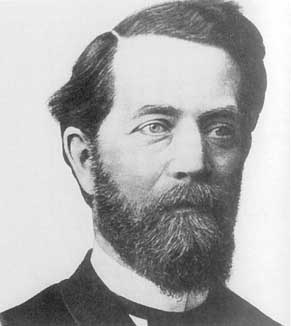Felix-Klein-Kolloquium 2024
Mathematisches Institut - HHU Düsseldorf
GRK 2240 "Algebro-Geometric Methods in Algebra, Arithmetic and Topology
Festkolloquium an der HHU Düsseldorf zum Anlass von Felix Kleins 175. Geburtstag.| Datum: | 25.04.2024 |
| Zeit: | Ab 14:15 Uhr |
| Ort: | Felix-Klein-Hörsaal 5F, Gebäude 25.21, HHU |
Organisatoren: Immanuel Halupczok, Holger Kammeyer und Benjamin Klopsch.

Am 25.04.1849 wurde der Mathematiker Felix Klein in der Jägerhofstraße 11 in Düsseldorf geboren (oder am 5².2².43², wie er es selbst gern scherzhaft mitteilte). Er studierte in Bonn und Berlin, habilitierte in Göttingen, bevor er mit nur 23 Jahren an die Universität Erlangen berufen wurde. Ab 1875 lehrte er an der Technischen Hochschule in München, ab 1880 an der Universität in Leipzig und schließlich ab 1886 bis zu seiner Emeritierung 1913 an der Universität Göttingen.
Mit seinem weitsichtigen Erlanger Programm von 1872, verschiedene Geometrien durch ihre Symmetrien und Transformationsgruppen zu verstehen und zu klassifizieren, beeinflusste er nachhaltig die Entwicklung der Geometrie in den darauffolgenden Jahrzehnten. Felix Klein gab in seinem Werk auch den Anwendungen der Mathematik viel Raum und geht als ein besonders erfolgreicher Wissenschaftsorganisator in die Geschichte ein. Ihm zu Ehren widmen wir an seinem 175. Geburtstag ein Festkolloqium mit Vorträgen von Valentin Blomer (Bonn) und Andreas Thom (Dresden).
Weitere Informationen zum Leben und Wirken von Felix Klein finden sich unter

Programm
- 14:15 Uhr: Begrüßung
- 14:30 Uhr - 15:30 Uhr: Vortrag von Valentin Blomer (Bonn), Hörsaal 5F
Equidistribution: number theory and dynamicsAbstract: The modular curve X, i.e. the upper half plane modulo the action of the group SL(2,Z), is one of the most prominent examples of a non-Euclidean space. It is a Riemannian orbifold with a lot of additional arithmetic structure. A famous theorem of Duke states that so-called Heegner points with growing discriminant become equidistributed on X. Likewise, low-lying horocycles and closed geodesics of growing length become equidistributed. In this talk, I will focus on mixing properties of such equidistribution results. As a protoype I consider two horocycles of different speeds and investigate under which conditions they equidistribute in the product X × X of two modular curves. - 15:30 Uhr - 16:15 Uhr: Kaffeepause, Konferenzraum 25.22.00.53
- 16:15 Uhr - 17:15 Uhr: Vortrag von Andreas Thom (Dresden), Hörsaal 5F
Equations over groupsAbstract: The study of equations in the language of groups has a long history and many applications. I will explain how topological methods can be applied to solve equations over groups and also mention some recent advances in the quest for a non-sofic group.
Mathematisches Institut - Heinrich-Heine-Universität Düsseldorf GRK 2240
Responsible for content: Holger Kammeyer Contact Imprint Data protection